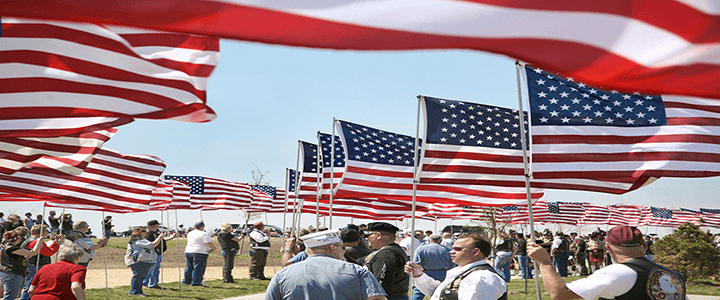Every Veterans Day, casual dining restaurants ask veterans to present a DD-214 in exchange for a free $13 meal. It’s a kind gesture, but is a little degrading at the same time, with clueless civilians inspecting your papers. (Personally, I’d rather starve, but I won’t judge you.) Meanwhile, there are some seriously great benefits out there that don’t get the same spotlight as free jalapeño poppers or extreme buffalo chicken strips. Here are a five veterans benefits you might not know about.
DRIVERS LICENSE IDENTIFIERS
I’m not saying that veterans have a slight advantage in getting out of traffic tickets, but I’m not saying they don’t, either. Law enforcement tends to attract the same sort of service-oriented, civic-minded person who might consider the military, and there’s a significant overlap in the numbers. While veterans make up only 6% of the population, they comprise 19% of the law enforcement workforce.
If you get pulled over, in other words, there’s a one-in-five chance that the cop with the ticket book once wore the uniform, and that might be your “in.” But pulling out your military ID is a bit on the nose, akin in spirit to pulling a fifty “accidentally” from your wallet while looking for your driver’s license. (Do not do this.) If you don’t have veterans plates on your car, until relatively recently you’ve been forced to somehow bring the war into the conversation. “Nice pistol, officer. I carried the same one in Afghanistan!” or “How about this heat? Man, just like Baghdad.” Nobody likes when you do that.
So here’s what you can do: get a “veteran” identifier on your driver’s license. Forty-nine states do this. (Virginia issues a separate “veteran ID,” but that defeats the purpose of what we’re going for, here.) And while every state’s design is different, the identifier generally consists of the word VETERAN printed on, or just below, your driver’s license photo. This can help you get discounts where such deals are offered, but it also lets the nice police officer who’s perturbed at your expired inspection sticker know that he or she is about to write a ticket to someone who wore the uniform. Even if you still get the ticket, you now have an excuse to complain bitterly about it over beers later with your friends.
SAVE ON YOUR CELL PHONE BILL
This is an easy one to forget when you’re eyeing that rose gold iPhone 13s, and the major providers sure aren’t going to remind you of it. Veterans receive a 15% monthly discount from the big four mobile phone companies. (Be forewarned that this usually means 15% off of your voice plan; they’ll still get you on data.)
POST-9/11 G.I. BILL
This one is hardly “little known” but it’s such an unbelievably good benefit with so many nuances that it should be mentioned at every opportunity. It not only pays 40%-100% of your college, but also covers apprenticeships and on-the-job training and vocational flight training, and comes with a book stipend and a monthly housing allowance. Do you attend a Yellow Ribbon School? (There’s a very good chance you do!) If you’re eligible for the full Post-9/11 G.I. Bill benefit, the Yellow Ribbon program can cover the cost of tuition over and above the limits set by the benefit. (Tuition at private and foreign schools have an academic year cap of $22,805.34.) The benefit can sometimes be transferred to a spouse, or children, or a spouse and children.
The details of this benefit are always changing—for example, there is now a proposal to extend 100% tuition to recipients of the Purple Heart—so be sure to check regularly. But the bottom line is that the government is practically begging you to go to school. Don’t miss your chance.
HOME HEALTH CARE BENEFIT
If you are eligible for a V.A. pension, you are eligible for the Aid and Attendance and Housebound benefit. Wartime injury or disability is not required to receive this benefit. (If you are over 65, the V.A. considers you “totally disabled,” which means one way or another you are probably eligible for the pension, which means you are eligible for this benefit.) It is paid in addition to your pension, and covers the cost of a home health caregiver or a nursing home. It’s not a small check, either—it pays over $2,000 for the aging veteran, and $1,000 for his or her surviving spouse.
As reported by the New York Times: Of the 1.7 million eligible World War II veterans alive in 2011, only 38,076 took advantage of the this benefit. That’s a fairly scandalous fact, and the result of V.A. employees simply not knowing the benefit existed. A non-profit organization called VeteranAid has since been established to help aging veterans learn about and receive the benefits to which they are entitled.
FUNERAL HONORS AND GRAVE MARKER
Nobody likes to think about death, but it’s going to happen to all of us. Which means you should probably put at least a little thought into what happens the day after. While you’re playing a harp, your survivors will have to figure out what to do with your mortal remains. Tell them now! Veterans are entitled to military funeral honors to include the folding and presenting of the American flag, and the playing of Taps. After the service, the deceased may be buried at a state or national veteran cemetery. Regardless of one’s final resting place, the V.A. will provide a (free and beautiful) engraved grave marker or headstone.


